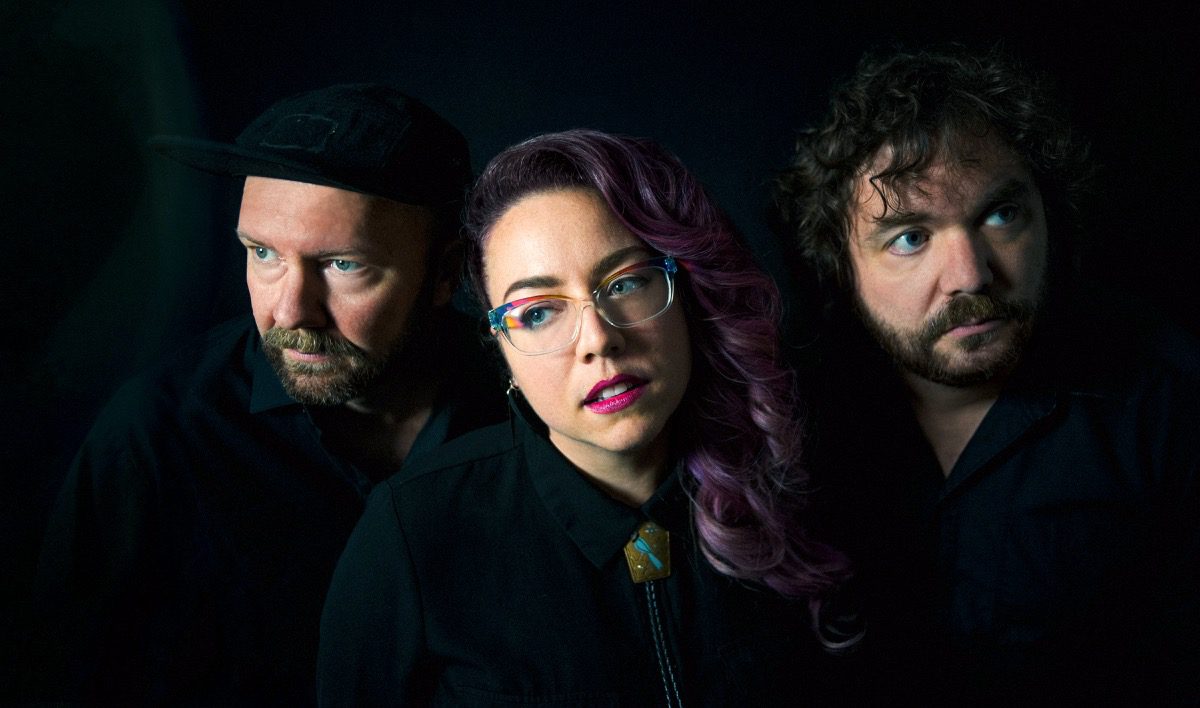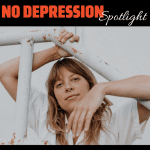SPOTLIGHT: Front Country Faces a Future That May Look Nothing Like the Past

Front Country, from left, Adam Roszkiewicz, Melody Walker, and Jacob Groopman. (Photo by Kaitlyn Raitz)
EDITOR’S NOTE: Front Country is No Depression‘s Spotlight band for October 2020. Read more about the band and their new album, Impossible World (out Oct. 30), here, and look for more from them later in the month.
Front Country has been on the road full-time for the past five years, and its members collectively have over 40 years of touring under their belt. What happens when a hard-working indie band goes from being on tour two-thirds of the year to being grounded at home indefinitely? The members of Front Country reflect on what this moment has brought to light for each of them and try to envision an uncertain future.
When Working Wasn’t Working
By Melody Walker
Touring indie bands run on pure adrenaline and faith.
The adrenaline of getting on stage every night on tour, the whole day revolving around that 90 minutes or so of fully embodied musical performance. And the faith, however foolish, that you will make it on that stage every night and that people will be there to share in that collective experience. For all the indignities and discomforts of the road, one transcendent experience in 20 can make it all seem worth it. It is an entirely irrational cult of belief, bolstered by that cycle of adrenaline and faith, and nothing short of a global standstill could stop it.
Enter Covid-19.
There’s nothing like a pandemic to shift perspective and paradigm, and the music industry got hit with a megadose of reality in March of 2020. It was a kind of death — the death of “normal” and all expectations — for everyone. (And, of course, literal death and grave illness for many.) Once all us indie musicians got through our initial grieving processes, we slowly began to talk frankly with one another and address the elephant in the room. Not everyone’s elephant is exactly the same, but the general shape of it is … was any of this actually working before?
The truth is, the shift had begun within our band before COVID hit, and when it hit I think we were relieved. It’s not that we didn’t have plans for 2020, but they certainly weren’t our best laid plans. We had committed to a new sound with a new album, and had resolved to begin bringing drums on the road this summer, but with no idea how we were going to restructure the business and touring setup to sustain it beyond that. We knew the music we wanted to make, and had played a few local shows in Nashville as this new ensemble, but we were honestly stumped as to how we would pull it off, financially, in the long term. Our best plan amounted to the plot from Field of Dreams, and not even faith and adrenaline could make that mess make sense.
The way we were working wasn’t working.
Let me explain, because I don’t mean to sound ungrateful. We were so lucky to have a circuit to tour at all, a community of roots music to lean on, and a career playing music that paid our basic living expenses. But it paid the bills and that was ALL. No savings, no retirement or investments, and certainly no medical emergencies allowed. There was no room to grow, and nothing left at the end of the year to reinvest in the business or ourselves. Yes, we were playing music for a living, but that living was about what a full-time Walmart employee makes in a year, then take 30% off the top in self-employment tax.
The music industry’s economic divide is just as wide as the nation’s, with a few winners at the top and the 99% scrambling for crumbs from their table. Unemployment delayed the sting for a while, but when that runs out and the recession really begins, this time amid a public health crisis, we won’t even have that pittance of security we enjoyed in the beforetimes. Our struggle is the same as every working-class American, and we ought to act like it.
The way the music industry is shaping up on the other side of the pandemic will only make this clearer. Half the venues we used to play will be gone, and replaced by one of the major corporate promotion companies. A memo leaked this summer from LiveNation said their new deals coming out of COVID will be even less favorable to artists than before. And if the current trend continues, soon they’ll own the entire game. No different from the small retail businesses around the country shuttering in droves while Amazon racks up a record second and third quarter. There’s no reason to think the live music industry won’t go the same way unless we actively fight to stop it through legislation and solidarity.
In the grind of the road and the indie band business struggle, I often reached my wits’ end only to find the concrete wall of the status quo threatening career suicide if I dared to defy it. How many times did I visit that brink and turn back in frustration, praying that one day the paradigm could change? Will we take “yes” for an answer and begin to build a musical future we actually want? Or will we rebuild a workplace that never loved us in the first place?
After years of grinding in the old paradigm, doing what I thought I had to do, it is hard now to even ask myself what I truly want to do. I guess I had better find out.
Going Remote
By Jacob Groopman
My favorite part of being a musician is gone. For now.
I love playing in front of an audience. Whether it’s five people at a bar or five thousand people at a festival, playing live is how I’ve existed for the last 15 years and why I’ve had no problem living in vans and airports for a staggering portion of that time. Now as a pandemic has gripped the world, humans gathering in groups (a key part to playing live) is not only not allowed, but has become a legitimate public health risk.
When streaming emerged 10 years ago and the whole idea of buying and owning music faded, the music industry was left standing on its one remaining leg: touring. As a result, live performance came to account for over 80% of an artist’s income. This year, the music industry has been completely upended by a new reality we are all attempting to navigate with stop-gap solutions.
I’m going to come right out and say it: I don’t like livestreaming. I’ve tried to wrap my head around it, but after every livestream I feel like I just played to an empty room because, well, that’s exactly what it is. Of course there are people watching online and there are comments and feedback after the fact, but it isn’t the same. Some musicians seem to be able to handle this new format better than others, but in talking with friends, I know I’m not alone.
Social media platforms quickly became a depressing landscape of musicians, big and small, desperately playing into their phones hoping to find that same addictive live performance feeling. At first the fans were supportive and generous with their time and tips, but as it became clear that the pandemic was going to last quite a bit longer than anyone thought and screen-time fatigue began setting in, there was a major drop off. I don’t blame the fans at all, because clearly this was not a sustainable model. I began to ask myself: Is this what we’re doing now? Playing online for tips? Is this what the music industry is now? I found myself looking closer at those Amazon fulfillment job openings I saw when filing my weekly unemployment claims.
Now, six months in, there’s no sign of a light at the end of the tunnel for professional musicians. My most sincere hope at the moment is that a huge number of artists and musicians don’t just pack it up and find another career. I’ve said for a while that I’m not a musician because I want to be. I’m a musician because I have to be. It’s who I am. This pandemic has challenged that notion more than I ever thought possible, but I am determined to find a way to reinvent myself and what I contribute to the world as a musician outside of live performance, touring, and recording the occasional album.
Great art can transcend constraints, but not being able to play in the same room as another musician or in front of a live audience is a new challenge. The question now is what’s the result of all this time spent operating remotely?
Uncertainty has been the central theme throughout the pandemic and there is no less uncertainty now than there was back in March. I’ve been trying to embrace the humility that uncertainty brings and allow it to drive my music and business choices moving forward. If there is a light at the end of the tunnel it’s time to start lighting it ourselves as a band, as artists, and as an industry and stop waiting for it to appear. Luckily I’m already seeing a few sparks here and there, but until the fire’s lit then I’ll be here in my room making music.
What Condition is Your Condition In?
By Adam Roszkiewicz
Trying to cultivate routine and healthy habits on the road can be as significant for a musician as making music, and while no one disputes the difficulties and the rewards of touring, one thing I think we don’t talk about enough is mental health. Conversations on this topic, both inside our various music scenes and outside them, are not as prevalent as I feel they should be and are often only sparked in the face of tragedy. We as a broader musical community have experienced some profound losses in the last few years alone, and while the responses have been emphatic the conversation often doesn’t continue after the initial shock.
There could be several reasons for this. We are in the entertainment business, and our goal is to entertain folks and add some levity to their lives, not remind them that the very people who are enhancing their lives are struggling. Another reason could be the ways in which we value art and artists as a society; often the choice to be a performer is viewed as one long party or an extended childhood. Another factor may be the cliché of the tormented artist; the thought that you can’t create good art without struggle. I wonder if that’s more something we tell ourselves as artists to somehow rationalize how mentally precarious this line of work can be.
But possibly the most common reason that mental health doesn’t get discussed much is because it’s personal, and private. While you might guess from the energy a performer puts out on stage that they aren’t struggling, we have learned that’s not always the case. Being a professional musician requires real sacrifice, and sometimes that sacrifice is at the expense of one’s health.
I feel a lot of the problem and part of the solution comes down to health care. Musicians in the US historically have poor to no health insurance, and often do not have the opportunity to take advantage of services that provide preventative care. Frankly I think that every touring musician should be assigned a therapist from tour number one, but I digress. There are some really excellent organizations, such as MusiCares, that provide support to musicians who need help, I believe their work is vital, but the solution is much broader and requires some systemic change.
How I found my own way to a more sustainable tour life came from, unsurprisingly, diet and exercise. I imposed some simple and flexible rules on what I could eat and when, and it made a huge difference in my energy level and state of mind. I also tried to run a few miles a day consistently while on tour, which was surprisingly more challenging than the diet part.
These simple steps made a big difference for me, but there are many musicians out on the road who need more than just some minor tweaks to their routine. Those are the ones who we need to keep the conversation going for, to continue asking questions and raising awareness for. Since COVID has put a hold on touring, this time off the road has given me an opportunity to reflect on how challenging the road can be, and what an important part of the puzzle one’s mental health is.




